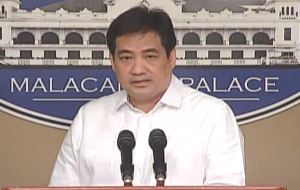Philippine News
Palace mulls appeal of SC ruling on DAP; many Filipinos benefit from DAP projects
MANILA — Malacanang is mulling on filing a motion for reconsideration after the Supreme Court (SC) declared unconstitutional some provisions of the Disbursement Acceleration Program (DAP), stressing that DAP-funded projects have benefited many Filipinos.
“The option is there to file a motion for reconsideration because that is a legal remedy provided under the rules of court,” said Presidential Spokesman Edwin Lacierda in a press briefing on Wednesday, as the Palace is still waiting for the copy of the SC full decision.
Lacierda said DAP-funded priority projects have benefited many Filipinos and partly boosted economic growth.
He cited as examples the Nationwide Operational Assessment of Hazards (NOAH), the Doppler radar system and school buildings projects.
Launched by the Department of Science and Technology (DOST), project NOAH is a responsive program for disaster prevention and mitigation for the country’s warning agencies to provide a six-hour lead-time warning to vulnerable communities against impending floods.
Lacierda stressed that the Palace thus does not regret using funds to accelerate projects that would benefit many Filipinos.
“How does one regret a decision to help thousands of people, of our countrymen? How does one regret installing a Doppler radar warning system? How does one regret the setting up of school buildings? These are noble projects which benefited the people,” he said.
The SC, on Tuesday, declared unconstitutional some provisions of the DAP.
Citing National Economic and Development Authority (NEDA) Secretary Arsenio Balisacan, Lacierda also attributed the increase in the country’s gross domestic product (GDP) partly to DAP.
Further, Lacierda stressed that the SC ruling on DAP is not a ground for impeachment of President Benigo S. Aquino III.
He said since the SC declared unconstitutional only some provisions of the DAP, “so it appears, therefore, that the entire DAP is not unconstitutional.
”
“In several administrations, perhaps you can go all the way back to the time of the previous presidency, you would have certain acts declared unconstitutional,” he added.
Lacierda said the Reproductive Health (RH) Law had eight provisions declared unconstitutional.
“We have several acts that have been declared unconstitutional in the past, not just in this administration, (but) it never reached the level of impeachability,” he said.






















